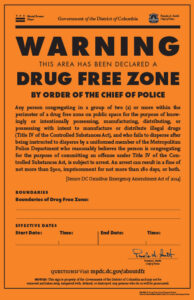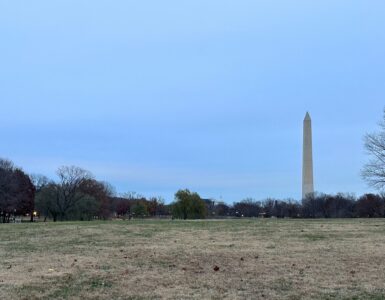Chinatown community leaders are urging city officials to expand the use of drug free zones in the area and boost visibility for the Safe Commercial Hub, a D.C.-run service center launched last year.
While they acknowledge that crime in the neighborhood is down from previous highs, leaders say these initiatives help project a sense of safety and stability to neighborhood residents.
At an Advisory Neighborhood Commission 2C meeting Sept. 9, 2C04 Commissioner Jim Swart said he reached out to Commander Colin Hall of the Metropolitan Police Department’s First District to ask for more frequent use of the drug free zones because he has seen them have positive impact in the area.
“It’s been an important piece of the crime reduction puzzle,” Hall said at the meeting. “I wish we could extend it.”
Over the past year and a half, D.C. officials have been leaning on a combination of initiatives to reshape Chinatown’s sense of security.
Mayor Muriel Bowser opened the Safe Commercial Corridor Hub in 2024 to connect residents to a range of services, with a focus to keep the neighborhoods clean and safe.
Bowser also reimplemented the drug free zones. The zones were created under the 1996 anti-loitering law to allow police to order groups in designated areas suspected of drug-related activity to disperse for up to 120 consecutive hours.
In 2014, the D.C. Council repealed the legislation, but in 2024 Bowser reinstated drug free zones with the goal to “interrupt activities and allow neighborhoods to clean up and reclaim public space.”
Howard Marks, a Chinatown resident since 2014, said it was the right choice and said he would like to see it implemented more often.
“Just by putting the orange posters, drug dealers avoid the area,” Marks said, referring to the posters used to announce the drug free zones. “It’s amazing, it created a new atmosphere.”

Marks, the vice president of the Gallery Place Condominium, which manages the residential portion of the mixed-use building at 777 7th Street NW, said he would like to see more drug free zones implemented around the Capital One Arena area.
Capt. Paul Hrebenak of the Metropolitan Police Department’s First District said the enforcement tool must be backed up by data showing high levels of drug or violent crimes in the neighborhood.
Chinatown has seen a decrease in crime and increase in security since the pandemic, according to Hrebenak, who said the achievement is due to a combination of several efforts.
In August, President Donald Trump declared the Metropolitan Police Department under “direct federal control,” an order that lasted for 30 days. Hrebenak said local law enforcement in Chinatown remained consistent during the takeover and prioritized transparency with the residents in the area.
“I can definitely understand that there’s been a shift, perhaps, as this takeover has happened, with the community trust in law enforcement,” Hrebenak said. “But in the medium term, things haven’t changed that much in our neighborhood-to-neighborhood response with MPD.”
Hrebenak said moving forward, MPD’s goal is to continue to improve the safety in the Chinatown area, but drug free zones are not the only focus.
He said the tactic is not a “silver bullet,” but the zones give officers a legal way to curb loitering tied to drug use and sales.

“No drug free zone is going to magically make an area not have drugs anymore,” Hrebenak said. “It’s not like we slap a drug free zone on a certain area and expect it to be all, end all. It’s a small part of a larger initiative to help some of these areas.”
John Kwon, manager of Chinatown Liquor Beer & Wine, has worked at the store on 602 H St. NW for the past 10 years.
Kwon said he’s watched the negative impact of the pandemic on the Chinatown area and the said the drug free zones and the Safe Commercial Corridor Hub have played a role in improving the area.
“The drug free zones help so much, and I would definitely like to see it implemented more often,” Kwon said. “But homeless is my biggest concern about safety.”
First District Officer Majohn Williams is stationed at the Safe Commercial Corridor Hub at 675 H St. NW.
Williams started working at the hub when it first open. For the past year and a half, she said she has seen violence in the area decrease alongside the calls for service. Williams echoed Kwon’s concern and said though safety has been improving, homelessness continues to be an issue in the area.
In addition, Williams said a lot of people in the Chinatown community don’t know about the hub.
“Some people may walk past it and not know what it is,” Williams said. “I do feel like it needs more advertisement, so the center is able to help more than what we’ve been helping.”
Marks raised the same concern during the September ANC meeting. He said the hub can’t be an effective tool for the community’s safety if it’s hidden. Marks encouraged the

city to improve the signs in front of the hub to help people understand its role better.
The Wash reached out to the mayor’s office and ANC 2C commissioner Thomas Lee but did not receive responses to questions in time for publication.
Councilmember Brooke Pinto (D-Ward 2) said she has worked with Chinatown residents and stakeholders on ways to support and enhance public safety. Pinto is the chairperson of the committee on the Judiciary and Public Safety, which is responsible for public safety issues including law enforcement, law enforcement oversight and also violence reduction in the city.
“Drug free zones are a critical tool for our local police to identify and address hotspots of crime activity to allow communities to reclaim public space,” Pinto said.
Hrebenak said while data can help the city and Chinatown residents have an idea of the bigger picture, the real measure of progress is how people experience the neighborhood.
“I think over the last few years, we’ve really seen the shift that’s been through investments like the Safe Commercial Corridor Hub and the Drug-Free Zones,” Hrebenak said. “But also we’ve made a conscious decision to make sure we have police resources in the area and we can ask people ‘How do you feel walking to work?’ ‘How do you feel living in Chinatown now?’ and there’s a huge difference from two years ago.”














Add comment